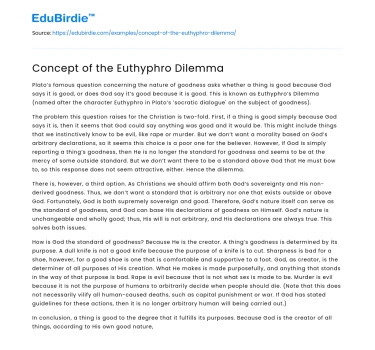Plato’s famous question concerning the nature of goodness asks whether a thing is good because God says it is good, or does God say it’s good because it is good. This is known as Euthyphro’s Dilemma (named after the character Euthyphro in Plato’s ’socratic dialogue' on the subject of goodness).
The problem this question raises for the Christian is two-fold. First, if a thing is good simply because God says it is, then it seems that God could say anything was good and it would be. This might include things that we instinctively know to be evil, like rape or murder. But we don’t want a morality based on God’s arbitrary declarations, so it seems this choice is a poor one for the believer. However, if God is simply reporting a thing’s goodness, then He is no longer the standard for goodness and seems to be at the mercy of some outside standard. But we don’t want there to be a standard above God that He must bow to, so this response does not seem attractive, either. Hence the dilemma.
Save your time!
We can take care of your essay
- Proper editing and formatting
- Free revision, title page, and bibliography
- Flexible prices and money-back guarantee
There is, however, a third option. As Christians we should affirm both God’s sovereignty and His non-derived goodness. Thus, we don’t want a standard that is arbitrary nor one that exists outside or above God. Fortunately, God is both supremely sovereign and good. Therefore, God’s nature itself can serve as the standard of goodness, and God can base His declarations of goodness on Himself. God’s nature is unchangeable and wholly good; thus, His will is not arbitrary, and His declarations are always true. This solves both issues.
How is God the standard of goodness? Because He is the creator. A thing’s goodness is determined by its purpose. A dull knife is not a good knife because the purpose of a knife is to cut. Sharpness is bad for a shoe, however, for a good shoe is one that is comfortable and supportive to a foot. God, as creator, is the determiner of all purposes of His creation. What He makes is made purposefully, and anything that stands in the way of that purpose is bad. Rape is evil because that is not what sex is made to be. Murder is evil because it is not the purpose of humans to arbitrarily decide when people should die. (Note that this does not necessarily vilify all human-caused deaths, such as capital punishment or war. If God has stated guidelines for these actions, then it is no longer arbitrary human will being carried out.)
In conclusion, a thing is good to the degree that it fulfills its purposes. Because God is the creator of all things, according to His own good nature, He is therefore both the standard and declarer of goodness.






 Stuck on your essay?
Stuck on your essay?

